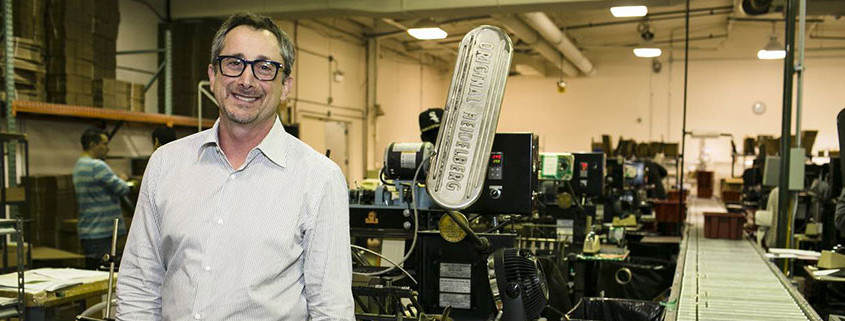Photo: Gary Morrison, 60 years old, wants his Skokie, Ill., printing company to hit certain growth and sales goals before selling it. PHOTO: Taylor Glascock for Wall Street Journal
By RUTH SIMON | Featured on WSJ
An expected rush in sales of small firms by the baby boomer generation has yet to materialize
Some baby boomers are having a tough time letting go.
Despite predictions that a flood of small businesses would be coming up for sale as owners of a certain generation ready themselves for retirement, many are holding on longer than expected.
According to a U.S. Census Bureau count of owners of incorporated firms, people age 55 and older accounted for 38% of business owners in 2013, the most recent data available, up from 29% in 2005.
The holdouts have many reasons. In some cases, younger family members aren’t interested in taking the reins, complicating succession planning. Others haven’t yet recovered financially from the recession.
“The world has changed and lifespans have changed,” says Judy Habib, the 61-year-old co-founder and chief executive of KHJ Brand Activation, a Boston-based marketing firm with 50 employees. “Baby boomers are so not dead yet,” she adds. “Do we really think we will fade off into the sunset? No.”
Ms. Habib hopes to mentor successors to allow her to take on an advisory role, but she hasn’t yet figured out what will happen to ownership of her 30-year-old company.
Sales of small firms are on pace to drop 3% this year, after increasing in 2014 to their highest levels since at least 2007, according to BizBuySell.com, an online marketplace for buying and selling small companies. Brokers reported 1,814 business changing hands in the third quarter, the company says, down 5% from the previous quarter and 9% from the same period a year earlier.
The “baby boomer rush in sales isn’t near the extent people were projecting four or five years ago,” said Ronald Johnson, the chairman of ABI Group Inc., a San Ramon, Calif., business broker. “A lot of business owners are in good health. They enjoy the challenge.”
Some analysts expect activity to pick up over the next few years as more boomers hit their 60s. Nearly one-third of owners of businesses with $100,000 to $10 million in annual sales anticipate a change in company ownership in the next five years, according to Barlow Research Associates Inc., a banking industry research firm. Most business owners expect to pass their business on to a family member or sell to a third party, but more than one-third of those with sales of less than $500,000 plan to liquidate, it says.
“The demographics would very much point you to the idea that there should have been this huge outflow of business owners,” says Daniel Olszewski, director of the Weinert Center for Entrepreneurship at the University of Wisconsin School of Business. “But it hasn’t really happened.”
Gary Morrison, the 60-year-old owner of AR-EN Party Printers Inc., says he gets more than a dozen offers a year from brokers who want to help him sell his Skokie, Ill.-based printing company, which specializes in monogrammed napkins, matches and other personalized party accessories. Mr. Morrison isn’t interested until he achieves his current goal of hitting 100 employees and $10 million in sales.
“I still think there is one more big growth spurt and then the company will be more valuable,” says Mr. Morrison, who bought the printing company from his mother two decades ago. He said he plans to keep at it until he is at least 65. “I love work,” he says. “I love being the emperor with no clothes here.”
Some business owners that struggled during the recession see new opportunities in the economic recovery. Robert Sharman, 59, a co-owner of Rowe Fenestration Inc., a consulting firm and supplier of materials used in commercial construction, says his 10-year-old firm used the downturn to hire high-quality workers, even though sales were slow. Now, with construction picking up, his plan is to double revenue every three years over a 12-year period before selling the company.
Preparing a small firm for sale often takes three years or more, says Michael Kalscheur, a senior financial consultant with Castle Wealth Advisors in Indianapolis, a process that includes getting a company’s financials to present a clear picture of its operation, training key managers and even more cosmetic fixes, like filling in potholes in the company parking lot.
Francine Manilow, 72, the owner of Chicago-based Manilow Suites Inc., a provider of extended-stay corporate housing, says it took her five years to find someone she thought was a good fit to take over as president of her 35-year old company.
“I’m finally after all these years getting to do what I love most, which is sales and marketing,” says Ms. Manilow, who eventually hopes to transfer ownership to her 24 employees. “By the beginning of the summer of next year,” she adds, “I hope to be free of most company responsibilities.”
—Paul Overberg contributed to this article.
Write to Ruth Simon at ruth.simon@wsj.com
Isler Northwest LLC is a firm of certified public accountants and business advisors based in Portland, Oregon. Our local, regional, and global resources, our expertise, and our emphasis on innovative solutions and continuity create value for our clients. Our service goal at Isler NW is to earn our clients’ trust in us as their primary business and financial advisors.
Isler Northwest
1300 SW 5th Avenue
Suite 2900
Portland, Oregon 97201



